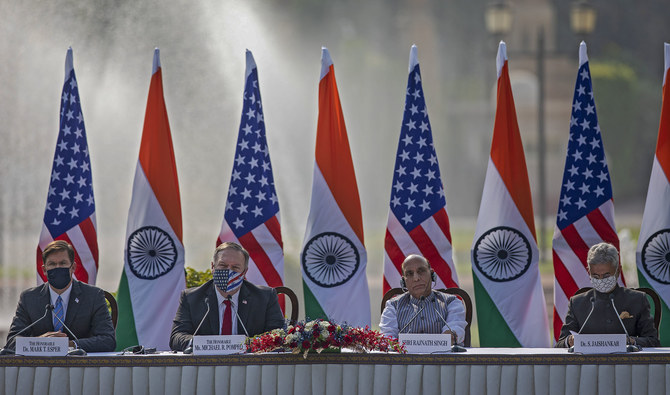ISLAMABAD: A security agreement signed between the United States and India on Tuesday would disturb strategic balance in South Asia by emboldening New Delhi to pursue its hegemonic ambitions in the region, defense experts said on Wednesday.
The two countries signed the defense pact, Basic Exchange and Cooperation Agreement on Geospatial Cooperation (BECA), during a high-profile visit of the US state and defense secretaries, Mike Pompeo and Mark Esper, to New Delhi for 2+2 talks.
The defense pact has been signed at a time when India is engaged in border standoffs with two of its neighbors, Pakistan and China.
“This defense deal is apparently aimed to counter the growing influence of China in the region, but we fear that India’s military buildup will ultimately be used against Pakistan,” Lt Gen (r) Amjad Shoaib, a defense analyst, told Arab News.
Under the agreement, the US will allow India access to a range of sensitive geospatial and aeronautical data that is considered vital for hitting missiles, drones and other targets with precision.
“The US is preparing India against China in the region, and this is quite a dangerous move for the whole region,” Shoaib continued. “This will disturb the strategic balance in South Asia besides pushing an arms race with countries like Pakistan.”
He said that India would bully its neighbors, especially smaller states like Nepal, to fulfill its hegemonic designs.
Shoaib noted that the US defense pact with India was “clearly aimed” at undermining the China-Pakistan Economic Corridor – a $60 billion infrastructure development project – since New Delhi was more than likely to engage in hostilities with Islamabad and Beijing.
“Pakistan should develop a cogent defense partnership with China to boost its military arsenal and be ready to respond to any aggression by India,” he suggested.
Pakistan’s foreign office has also “taken note” of the US-India defense pact, saying it had been consistently highlighting the threats posed to strategic stability in South Asia as a result of provision of advanced military hardware, technologies and knowledge to India.
“India’s massive acquisition of armaments and expansion of its nuclear forces, including introduction of new destabilizing weapon systems, are developments with serious repercussions for peace and stability in South Asia,” it said in a statement on Tuesday.
The foreign office also reacted to a joint statement issued by the two countries after the ministerial dialogue that “called on Pakistan to take immediate, sustained and irreversible action to ensure that no territory under its control is used for terrorist attacks.”
“Gratuitous and self-serving references in joint statements cannot mask the fact that it is India that continues to be the nerve center of state-terrorism in the region including Indian Illegally Occupied Jammu & Kashmir [IIOJK], besides being a safe haven for the perpetrators of hate crimes against Muslims and Islamophobia,” said the foreign office.
“By seeking to project itself as ‘victim’ of terrorism, India cannot divert attention from the gross human rights violations being perpetrated by Indian occupation forces and the resulting humanitarian crisis in IIOJK,” it added.
India is one of the world’s biggest defense equipment buyers, but around 60-70 percent of its inventory is supplied by Russia.
Mosharraf Zaidi, a political and security analyst, said the US-India defense pact was “part of a very substantial and major push” by the Americans to consolidate their linkages and ingress into the region, essentially because of the level of competitiveness between the US and China.
“If there was that level of sharing between the US and India that obviously would have very significant impact on Pakistan’s own risk and threat assessment,” he told Arab News.
“What I think the BECA doesn’t allude to at least in terms of the open source discussions about it is whether or not the provisions of BECA relate to Pakistan or not,” he said, hoping that Pakistani authorities would take it up with America.
















